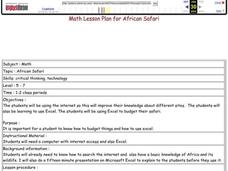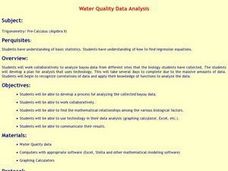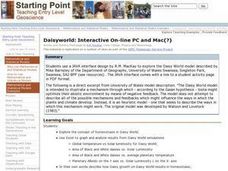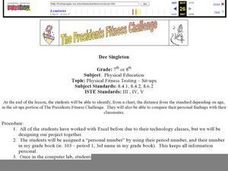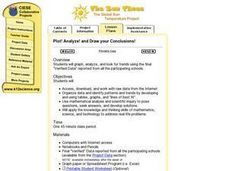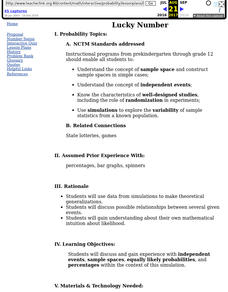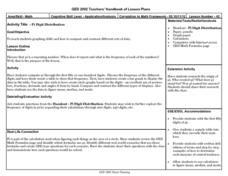Curated OER
Has Change Been Good for Texas?
Fourth graders identify the events and inventions that have caused a change in the state of Texas. Using the internet, they research the year these took place and create a timeline. They identify the positive or negative impact of each...
Curated OER
African Safari
Learners create an Excel spreadsheet that show a budget for a trip to Africa to see wildlife. In small groups, they complete internet research to determine the countries and sites to visit then calculate the costs involved for the trip....
Curated OER
The Great Turkey Walk
Young scholars formulate questions that can be addressed with data and collect, organize, and display relevant data to answer them. They wcreate bar graphs and pie graphs
Curated OER
The Dead Zone: A Marine Horror Story
High schoolers graph dissolved oxygen versus depth using data taken from NECOP Program. In this marine science lesson, students explain the causes of hypoxia. They recommend possible solutions to this problem.
Curated OER
Water Quality Data Analysis
Students develop a process for analyzing collected bayou data.
They find the mathematical relationships among various biological factors.
Students, work collaboratively using technology in their data analysis.
Curated OER
Sea Floor Spreading II
Students import ocean bathymetry data form either the topex web site or text files. They then graph these observations along with model predictions to assess the model's ability to sumulate the observed topographic features of the North...
Curated OER
Checking County Numbers
Students use their county's information page to gather information about their community. Using the information, they create graphs from the tables provided and interpret the data. They write a paragraph showing their interpretation of...
Curated OER
Hide and Survive: A Natural Selection Activity
Students explore the theory of natural selection given certain scenarios. In this biology lesson, students graph data taken from the experiment. They explain the factors that contribute to the survival of the fittest.
Curated OER
Sea Surface Temperature Trends of the Gulf Stream
Students explore the importance of the Gulf Stream. Using a NASA satellite images, they examine the sea surface temperature. Students collect the temperature at various locations and times. Using spreadsheet technology, they graph the...
Curated OER
Sea Surface Temperature Trends of the Gulf Stream
Students use authentic satellite data to produce plots and graphs of sea surface temperature as they explore the seasonal changes of the Gulf Stream.
Curated OER
Plants Under Attack
Third graders will identify the four needs for plant survival and gain skills and confidence in using scientific measurement tools, probes as well as the spreadsheets and graphing capacity of a computer to represent and analyze data.They...
Curated OER
Finding the Percent of a Number in Fish Body Weight
Middle schoolers use fractions to find the weight of fish. They use percentages to determine the correct amount to feed them. They organize their data into a graph and shares with the class.
Curated OER
Daisyworld: Interactive On-line PC and Mac
Students use a JAVA interface to explore the Daisy World model to illustrate a mechanism through which - according to the Gaian hypothesis - biota might optimize their abiotic environment by means of negative feedback.
Curated OER
Learning About Graphics
Learners practice using and filling in a spreadsheet. They also create graphs and charts that coorespond with the data. This is a unit comprised of four lesson plans.
Curated OER
The President's Fitness Challenge
Students identify, from a chart, the distance from the standard depending on age, in the sit-ups portion of The Presidents Fitness Challenge. They will also be able to compare their personal findings with their classmates.
Curated OER
Plot! Analyze! Draw your Conclusions!
Students download data reported from the Global Sun Temperature Project website. They graph and analyze the data looking for trends and patterns. They prepare a class report with their observations and post it to the website.
Curated OER
What Do Plants Need to Grow?
Fourth graders control variables to determine the effect on plant growth. They collect information by observing and measuring and construct simple graphs, tables, maps and charts to organize, examine and evaluate information.
Curated OER
Area graphics for 7th graders
Students randomly select dimensions for three geometric shapes (square, right triangle and circle). From the graphs they compare and contrast the graphical results of each shape.
Curated OER
Lucky Number
Students use data from simulations to make theoretical generalizations. They discuss possible relationships between several given events and gain understanding about their own mathematical intuition about likelihood.
Curated OER
You want me to do what with this Dirt?
Eighth graders explore how to take soil samples and use GPS to determine the location of the site they have chosen to take the samples.
Curated OER
Pi Digit Distribution
Students study graphing skills and compare and contrast data sets. They compute pi through the first 50-100 digits and create a bar graph showing the frequencies of specific digits.
Curated OER
Sense-Ability
Students use comparisons, graphing, patterning, and sorting, and develop language skills as they explore the five senses.
Curated OER
Asthma "Outbreak" Exercise
Students investigate numerical data on a possible asthma epidemic. Using statistical information, students graph and figure ratios of the epidemic. They evaluate the mortality rate from severe smog in the 1950's in London.
Curated OER
Weights and Measures
Young scholars master the gathering, averaging and graphing of data. They practice conversion to metric measures. They gain fluency in the use of technology tools for math operations.

